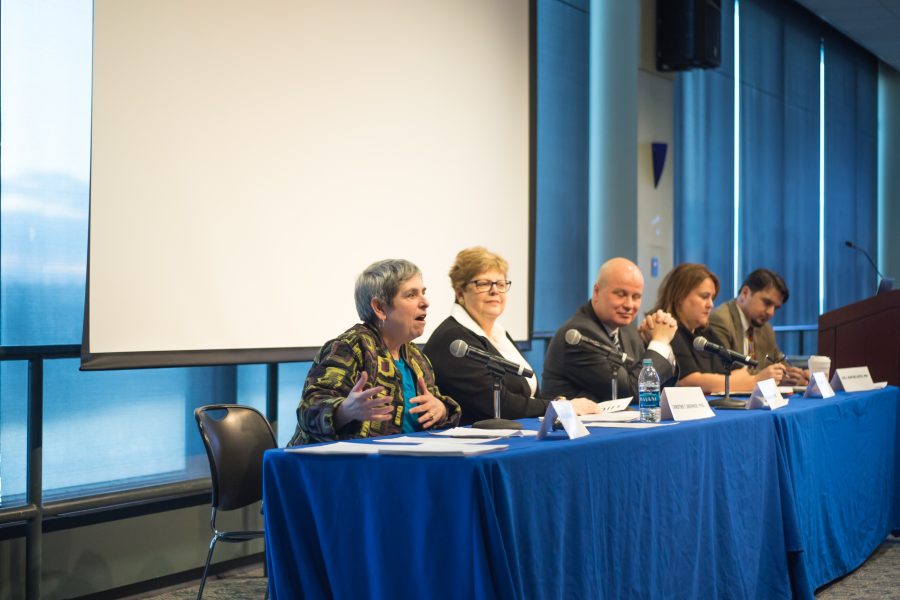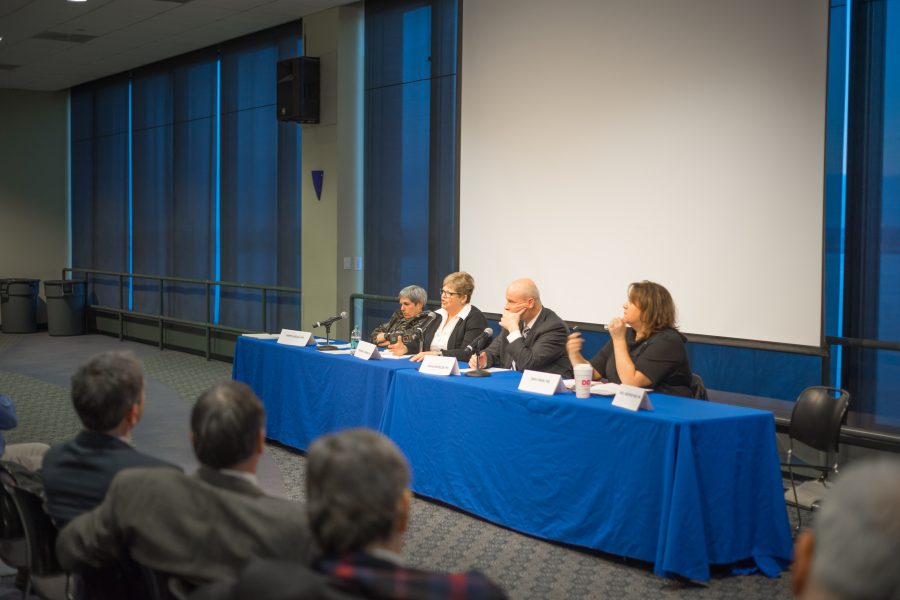On Feb. 1, the John W. McCormack Graduate School of Policy and Global Studies, joined by the College of Liberal Arts, invited students, staff, and faculty to a policy roundtable to debate the Trump administration and its domestic policy, as well as what kind of policy proposals can be expected to emerge over the next four years.
The panelists who shared their knowledge on the variety of issues included Professor Randy Albeda from the Department of Economics, Associate Professor and Chair Christine T. Brenner from the Department of Public Policy and Public Affairs, Associate Professor and Chair Erin O’Brien from the Department of Political Science, and Professor Christian Weller from the Department of Public Policy and Public Affairs. Associate Professor of Anthropology Jose E. Martinez-Reyes led the event and served as the moderator.
In the opening speech, David W. Cash, Dean of the McCormack Graduate School, explained that due the recent elections and strong responses by the public and the University of Massachusetts Boston community, including an “unprecedented number of protests,” there was the “need to discuss and analyze issues.”
Martinez-Reyes described the current political landscape as being very different from the previous decades and pointed out that this was “not an ordinary election.” While there is still a high level of uncertainty regarding future policies and legislations at this point in time, the professor said that “the outcome has people on the edge of their seats” and that there “a lot of concern among people.”
In the discussion, O’Brien predicted that “major domestic policy change is coming.” For example, according to many experts, the Affordable Care Act, or “Obamacare,” will most likely be repealed once the Republican leadership develops an alternative to it. Furthermore, experts have predict that Planned Parenthood will receive less overall funding, while NAFTA will possibly be renegotiated. O’Brien also said that is likely that economic inequality will grow and that there will be a change in how the administration positions itself towards public agencies, as the former has taken an adversarial stance towards civil servants.
In his reflection, Weller gave a mostly negative outlook and explained that “Trump will hurt, not help, the economy.” One issue that is likely to come up in these next few years, according to Weller, is the trend of growing income inequality all across the country. Weller emphasized that in order to counter that and boost income growth, the administration would have to support workers and employees in general, and develop policies for that. However, many experts see this scenario are being highly unlikely.
Regarding immigration policies, Brenner explained that up until now, President Trump has applied the “frame of national security” when addressing these issues. However, this attitude of “keeping terrorists out” has popularized an “implied racism” that promotes hostility against immigrants and non-Americans from certain countries. Here, Brenner pointed to the difference between the Northern and Southern borders of the United States and how differently they are viewed. While there is no physical obstacle erected at the Canadian border, the Mexican border is heavily guarded and already has some parts bordered with a fence or wall. Furthermore, Brenner also questioned the efficiency and logic of the future expanded border wall. On the one hand some terrain is so forbidding that it is not possible to build one, and on the other hand human traffickers will always find a way to get people into the country.
In her assessment, Albelda said that it is not likely that Trump will show much interest in low-income people and their difficult situations. Rather, people will probably lose their access to healthcare and other social services. At the same time the Trump administration will develop policies that will lead to an “acceleration of the ability to take more surplus,” as well as pursue more deregulation in the market.
While these predictions seem rather negative, the policy experts also pointed out that it is necessary for the public to become more involved in order to protect existing policies. O’Brien also pointed out that there are ways to fight and take a stance. She noted that “politics got us into this mess, and politics will get us out of it.” She also added that it is important to form alliances with people while also rethinking already existing ones. Brenner suggested that activism will become crucial as a tool to push back. Brenner also pointed out that the midterm elections in 2018 will be a critical point in time for the future of country. In her view, it is at the grassroots level where people can especially start getting more involved.
Another policy roundtable about Trump’s foreign policy will be hosted on Feb. 7 at 4 p.m. at the Ryan Lounge in McCormack Hall.
(Left to Right) Photo of Randy Albelda, PHD(1st), Christine T. Brenner, PH.D(2nd), Christian Weller, PH.D(3rd), and Erin O'Brien, PH.D(4th)


